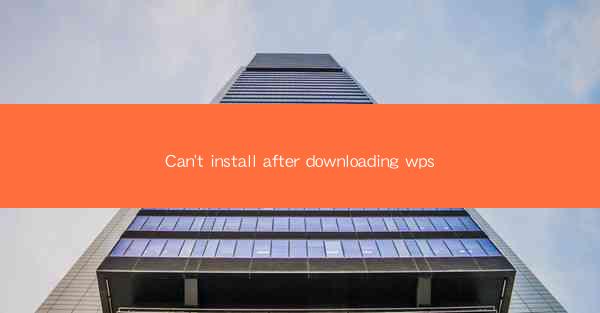
The article delves into the common issue faced by users who encounter difficulties in installing WPS after downloading it. It explores various reasons behind this problem, including compatibility issues, corrupted files, insufficient system requirements, and technical errors. The article provides detailed explanations and solutions for each of these issues, aiming to help users successfully install WPS and continue their productivity journey.
---
Introduction to the Problem
The frustration of downloading a software like WPS, a popular office suite, only to encounter an installation roadblock can be quite disheartening. This article aims to address the common issue of Can't install after downloading WPS by examining the potential causes and offering practical solutions to overcome this challenge.
1. Compatibility Issues
One of the primary reasons for the installation failure could be compatibility issues. WPS is designed to work on specific operating systems and versions. Here are a few points to consider:
- Operating System Version: Ensure that the version of the operating system you are using is compatible with WPS. For instance, WPS Office 2019 is compatible with Windows 7, 8, and 10, but not with Windows XP or Vista.
- Processor Architecture: Check if your system is 32-bit or 64-bit and download the corresponding version of WPS. Installing a 64-bit version on a 32-bit system or vice versa can lead to installation errors.
- Additional Software: Sometimes, certain software or drivers installed on your system might conflict with WPS. Uninstalling these conflicting programs can resolve the issue.
2. Corrupted Files
Corrupted files during the download process can prevent the installation from proceeding. Here are some steps to address this:
- Re-download the File: Start by downloading the installation file again from a trusted source. Sometimes, the initial download might be incomplete or corrupted.
- Use a Different Browser: If you are using a web browser to download WPS, try using a different browser. Some browsers might have issues with downloading large files.
- Check for Viruses: Ensure that your computer is free from viruses or malware, as these can corrupt files during the download process.
3. Insufficient System Requirements
WPS has specific system requirements that must be met for successful installation. Here's what to look out for:
- Minimum Hardware Requirements: Check the minimum hardware requirements specified by WPS, including CPU, RAM, and disk space. Failing to meet these requirements can lead to installation failures.
- Graphics Card: WPS requires a graphics card with a resolution of at least 1024x768. If your system does not meet this requirement, consider upgrading your hardware.
- Additional Software: Some features of WPS might require additional software or libraries to be installed on your system. Make sure to install these prerequisites before attempting to install WPS.
4. Technical Errors
Technical errors can also cause installation issues. Here are some common technical errors and their solutions:
- Error Messages: Pay attention to any error messages displayed during the installation process. These messages can provide clues about the specific issue.
- Installation Logs: Check the installation logs for any errors or warnings. These logs can be found in the installation directory and can help diagnose the problem.
- Contact Support: If you are unable to resolve the issue on your own, contact WPS customer support for assistance.
5. User Errors
Sometimes, the issue might not be with the software itself but with the user's actions during the installation process. Here are a few points to consider:
- Follow Instructions: Make sure to follow the installation instructions carefully. Skipping steps or interrupting the installation process can lead to errors.
- Admin Rights: Ensure that you have administrative rights on your system to install software. Without these rights, the installation might fail.
- Antivirus Software: Temporarily disable your antivirus software during the installation process. Some antivirus programs might block the installation of certain software.
6. Alternative Solutions
If the standard installation process fails, there are alternative solutions you can try:
- Use an Installer: Some users have reported success by using third-party installers or mounting the installation file as a virtual drive.
- Manual Installation: In some cases, manually installing WPS by extracting the files and running the setup.exe file can resolve the issue.
- Reinstall the Operating System: As a last resort, if none of the above solutions work, you might need to consider reinstalling your operating system.
Conclusion
The Can't install after downloading WPS issue can stem from various factors, ranging from compatibility issues to technical errors. By understanding these potential causes and following the outlined solutions, users can overcome this challenge and successfully install WPS. Whether it's ensuring compatibility, checking for corrupted files, meeting system requirements, or addressing technical errors, this article provides a comprehensive guide to help users get back to their productivity journey with WPS.











